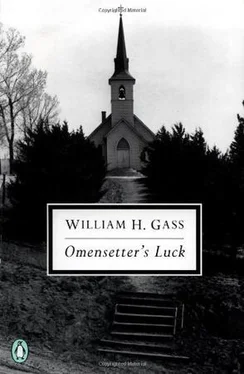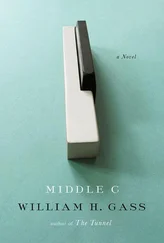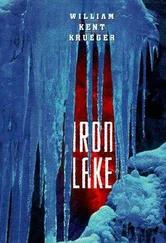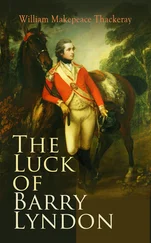We must conclude he is the worst.
He is the worst.
Therefore.
2
Twilight was moving through the woods upon the fields when the Reverend Jethro Furber, pebbles in his shoes, sand pushing between his toes, limped down the River Road to Henry Pimber's house. Trees divided the pale sheet of water on his left, while on his right loomed a bank of darkness like a battlement. The air was quiet, there was cloud, and all the sounds that human silence sharpens were, unearthly, stopped. The house seemed a deep extension of the trees, and Furber began to wonder what fool conceit or cowardice had driven him. He decided it was both: there was cowardice in his coming at all; there was conceit, certainly, in the melodrama of the moment he had chosen. Now and then the moon appeared and bleached a path across the road. He heard a horse, and far away, perhaps in town, a lonely bark. The pebbles pressed against the bottoms of his feet. It had been a delicious pair of pains at first but now it made him wobble awkwardly. Madame, the clergy has come to call: give greeting. He looked about. The long lane was silent. The Holy Spirit has no better emissary: loose loud hurrahs. His mouth twisted sourly as he heard himself. Furber turned past the forsythia, wading in a trench of shade to penetrate the darkness that lay beyond the lilacs, and soon he reached the steps where he could see the neighborly gift of Mrs. Gladys Chamlay glimmering quietly in the moonlight and groaning from neglect. Though its shining is silent, there's speech in the spoiling. Furber considered whether this expression was worth recording and decided against it. He raised the napkin covering the picnic basket and in the moonlight ants splashed like pepper past his feet. Leaning shame against fear, he removed one shoe at last, and in the moonlight emptied it of sand and stones, roughly dusting his sock. Since the leather had a tendency to wad, he shoved his foot back through the shoe's high neck with difficulty. He then drew from the other an easing stream. Both feet' comfortably shod again, he tromped noisily across the porch and pounded on the door, startling a bird which rose angrily from its bush. Twice he called her name, then waited, feeling absurd. The aches in his feet were subsiding. He felt he ought to stop and tie his shoes, but he had compunctions about kneeling. In the morning he'd have more than a bruise. Attempting to listen, he went carefully down the steps and quickly toward the back of the house. In that moment the resting branches turned their leaves. Brilliantly, the still grass glittered. He found the side door locked, the rear door bolted. The cellar door seemed hooked. Ineffectually, he tugged and hauled at windows, beginning to wheeze. His heels were rising in his shoes, the laces slapping. Nor could he tolerate the funk he was in. Were there goblins in the gumtrees, ghosts in the cupboards? He had no fear of spirits surely — of brooming witches, of gnomes, elves, sprites. Bear in mind: hate finds nothing hard. He ought to make a note of that. Nevertheless he could not ignore the figure he was cutting. Distraught, he wandered aimlessly about until he stumbled on a stick which, when he discovered what it was, he seized in a fury, attacking the house. By prying with it, he made a window squeak. Next he balanced a rock on a box and stood on these, the better to shove and heave. Yes indeed, he was an accomplished comedian and entrancing equilibrist, favorite of queens. At last he was able to squeeze inside. Something fell as he entered. Whatever it was, it did not break, but rolled slowly across the floor: a-runk, a-runk, a-runk. He couldn't remember how the furniture was arranged or where in the house he was. The children who had spied on her, as he'd been told, claimed she roamed the building with a lamp, but the place was cold, the air unstirred, the darkness unrelieved. He sneezed — curtain across his face. Now where are you, Lucy, he yelled, ashamed of the quaver in his voice. But he might come on her corpse. Swimming in the dark, he might bump it with his nose, or his foot might crush its fingers. Then Henry's head might moon, his fierce eyes stare, the covers close about his neck like foam, and Furber would hear his own voice singing die in a relentless monotone — die die die. He turned back to the window, terrified, bumping a chair which slid on the unrugged floor. Above him, on what he later decided were the back stairs, a figure appeared wrapped in gauze, holding a faintly burning lamp. Sagging. Furber uttered an uncourageous groan. Backett, is that you, Lucy Pimber said in a whisper.
It was, no one could doubt it, a great stroke of luck, and the sense of her words brought him to his feet in a moment. It is I, the Reverend Jethro Furber, he formally announced. She fled up the stairs. The pale light danced as he stumbled after her. Don't be frightened. Don't be frightened. She extinguished the lamp and he thought he would never find her. Before he did, the whole business had gotten thoroughly on his nerves, his old illness had returned, and even his bones shook. He cradled the rail in his arms. He was blind — a buzzing in his eyes. Despite the grotesqueness of the wish, a part of him wanted to be mistaken for the huge hide-wetter who was so marvelously fitted and so universally desired. Another part didn't care at all about that, but would have been immensely gratified to have her fall beneath him, opening easily, whoever she thought he was. So what if her breasts were like pancakes. Nor was that all he wanted, for he was in a thousand careening pieces like a shattered army. However, when at last he dragged Lucy from the linen closet and obtained the lamp — she was a torn and dirty spirit, certainly, for she'd fouled her clothes — he was nearly sickened by the smell of her, it was so strong and fecal. He possessed the lamp but had no way to light it, and while he stood stupidly considering this, she flew through the darkness again, whining weirdly like a bat. In pursuit, Furber fell on the stairs, smashing the mantle. Rattled, he shouted threats. You're to tell no one I fell, you hear, smell-belly, he roared. You're loony, you hear me? You're loony Lucy. He was beginning to see quite well now, and he found her hunched under the table in the kitchen mewing and spitting like a cat. Twisting a great knot in her nightdress, he pulled her out, saying experimentally, "I am Backett Omensetter," in a deep bass voice. When he heard her chuckle he struck out blindly, hitting her several times on the head and shoulders. These blows rendered her docile, and though exhausted by his own emotions, he was able to restore her to the care of her friends without further difficulty or exertion.
Not many days after, at the Hatstat's where Lucy had been taken to recover, he was even able to offer her a good deal of excellent advice concerning the management of her life in the future. He was aware, at the time, of his stiffness, of the extreme correctness of his deportment all in all; but Lucy Pimber, though she seemed as large-eyed as an owl and nearly as watchful, listened to his lengthy and somewhat elaborate monologue, despite the cold remoteness of its tone and the unflinching directness of its message, with a steady, calm, and sober mien throughout, for which Furber, more than once in the weeks that followed, gave grateful thanks to ghosts, elves, sprites, gnomes, witches — all of the disloyal angels, each of the fallen gods.
3
It was an afternoon of weak sun, the hour was late, and Mat appeared slowly on the end of the street. Outside his shop, as lightly as a water bird, Jethro Furber waited, and so observed reluctance enter the blacksmith's knees. It's lovely to be loved, he thought bitterly, rising to tiptoe and pulling the collar of his coat around his neck. Love… hate… what did it matter which it was? He was ready for either. His plans were made. His speeches had been well rehearsed. He had his courage and his anger up, his makeup straight, his costume fresh, its creases squeezed so ardently they gave him edges like a knife. Furthermore, he knew his man. That was a terrible thing — to know your man; terrible, that is, for the man known, if it was true. And in this case, it was true. He did know. He knew. Mat's imagination would undo him.
Читать дальше












![William Frith - John Leech, His Life and Work, Vol. 2 [of 2]](/books/748201/william-frith-john-leech-his-life-and-work-vol-thumb.webp)